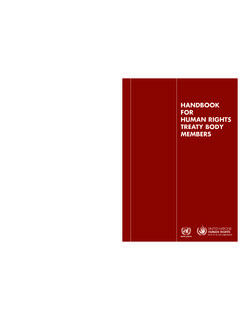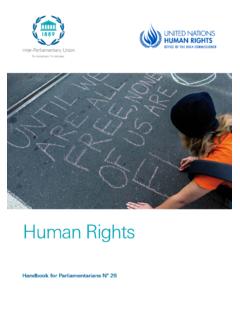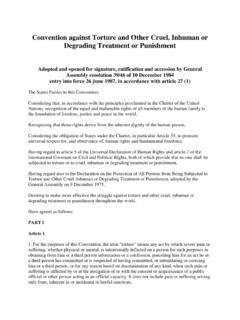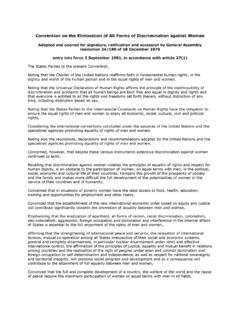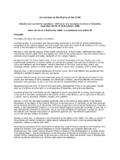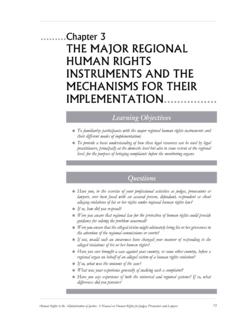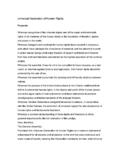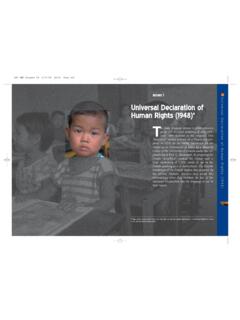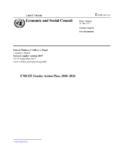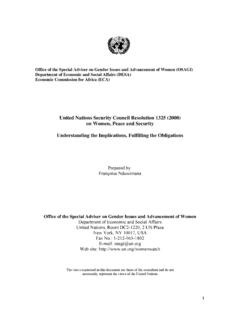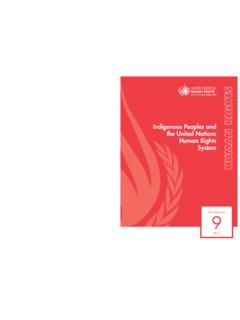Transcription of Standard Minimum Rules for the Treatment of …
1 Standard Minimum Rules for the Treatment of Prisoners Adopted by the First united nations Congress on the Prevention of Crime and the Treatment of Offenders, held at Geneva in 1955, and approved by the economic and Social Council by its resolutions 663 C (XXIV) of 31 July 1957 and 2076 (LXII). of 13 May 1977. PRELIMINARY OBSERVATIONS. 1. The following Rules are not intended to describe in detail a model system of penal institutions. They seek only, on the basis of the general consensus of contemporary thought and the essential elements of the most adequate systems of today, to set out what is generally accepted as being good principle and practice in the Treatment of prisoners and the management of institutions. 2. In view of the great variety of legal, social, economic and geographical conditions of the world, it is evident that not all of the Rules are capable of application in all places and at all times. They should, however, serve to stimulate a constant endeavour to overcome practical difficulties in the way of their application, in the knowledge that they represent, as a whole, the Minimum conditions which are accepted as suitable by the united nations .
2 3. On the other hand, the Rules cover a field in which thought is constantly developing. They are not intended to preclude experiment and practices, provided these are in harmony with the principles and seek to further the purposes which derive from the text of the Rules as a whole. It will always be justifiable for the central prison administration to authorize departures from the Rules in this spirit. 4. (1) Part I of the Rules covers the general management of institutions, and is applicable to all categories of prisoners, criminal or civil, untried or convicted, including prisoners subject to "security measures" or corrective measures ordered by the judge. (2) Part II contains Rules applicable only to the special categories dealt with in each section. Nevertheless, the Rules under section A, applicable to prisoners under sentence, shall be equally applicable to categories of prisoners dealt with in sections B, C and D, provided they do not conflict with the Rules governing those categories and are for their benefit.
3 5. (1) The Rules do not seek to regulate the management of institutions set aside for young persons such as Borstal institutions or correctional schools, but in general part I would be equally applicable in such institutions. (2) The category of young prisoners should include at least all young persons who come within the jurisdiction of juvenile courts. As a rule, such young persons should not be sentenced to imprisonment. Part I. Rules OF GENERAL APPLICATION. Basic principle 6. (1) The following Rules shall be applied impartially. There shall be no discrimination on grounds of race, colour, sex, language, religion, political or other opinion, national or social origin, property, birth or other status. (2) On the other hand, it is necessary to respect the religious beliefs and moral precepts of the group to which a prisoner belongs. Register 2. 7. (1) In every place where persons are imprisoned there shall be kept a bound registration book with numbered pages in which shall be entered in respect of each prisoner received: ( a ) Information concerning his identity.
4 ( b ) The reasons for his commitment and the authority therefor;. ( c ) The day and hour of his admission and release. (2) No person shall be received in an institution without a valid commitment order of which the details shall have been previously entered in the register. Separation of categories 8. The different categories of prisoners shall be kept in separate institutions or parts of institutions taking account of their sex, age, criminal record, the legal reason for their detention and the necessities of their Treatment . Thus, ( a ) Men and women shall so far as possible be detained in separate institutions; in an institution which receives both men and women the whole of the premises allocated to women shall be entirely separate;. ( b ) Untried prisoners shall be kept separate from convicted prisoners;. ( c ) Persons imprisoned for debt and other civil prisoners shall be kept separate from persons imprisoned by reason of a criminal offence;. ( d ) Young prisoners shall be kept separate from adults.
5 Accommodation 9. (1) Where sleeping accommodation is in individual cells or rooms, each prisoner shall occupy by night a cell or room by himself. If for special reasons, such as temporary overcrowding, it becomes necessary for the central prison administration to make an exception to this rule, it is not desirable to have two prisoners in a cell or room. (2) Where dormitories are used, they shall be occupied by prisoners carefully selected as being suitable to associate with one another in those conditions. There shall be regular supervision by night, in keeping with the nature of the institution. 10. All accommodation provided for the use of prisoners and in particular all sleeping accommodation shall meet all requirements of health, due regard being paid to climatic conditions and particularly to cubic content of air, Minimum floor space, lighting, heating and ventilation. 11. In all places where prisoners are required to live or work, ( a ) The windows shall be large enough to enable the prisoners to read or work by natural light, and shall be so constructed that they can allow the entrance of fresh air whether or not there is artificial ventilation.
6 ( b ) Artificial light shall be provided sufficient for the prisoners to read or work without injury to eyesight. 12. The sanitary installations shall be adequate to enable every prisoner to comply with the needs of nature when necessary and in a clean and decent manner. 13. Adequate bathing and shower installations shall be provided so that every prisoner may be enabled and required to have a bath or shower, at a temperature suitable to the climate, as frequently as 3. necessary for general hygiene according to season and geographical region, but at least once a week in a temperate climate. 14. All parts of an institution regularly used by prisoners shall be properly maintained and kept scrupulously clean at all times. Personal hygiene 15. Prisoners shall be required to keep their persons clean, and to this end they shall be provided with water and with such toilet articles as are necessary for health and cleanliness. 16. In order that prisoners may maintain a good appearance compatible with their self-respect, facilities shall be provided for the proper care of the hair and beard, and men shall be enabled to shave regularly.
7 Clothing and bedding 17. (1) Every prisoner who is not allowed to wear his own clothing shall be provided with an outfit of clothing suitable for the climate and adequate to keep him in good health. Such clothing shall in no manner be degrading or humiliating. (2) All clothing shall be clean and kept in proper condition. Underclothing shall be changed and washed as often as necessary for the maintenance of hygiene. (3) In exceptional circumstances, whenever a prisoner is removed outside the institution for an authorized purpose, he shall be allowed to wear his own clothing or other inconspicuous clothing. 18. If prisoners are allowed to wear their own clothing, arrangements shall be made on their admission to the institution to ensure that it shall be clean and fit for use. 19. Every prisoner shall, in accordance with local or national standards, be provided with a separate bed, and with separate and sufficient bedding which shall be clean when issued, kept in good order and changed often enough to ensure its cleanliness.
8 Food 20. (1) Every prisoner shall be provided by the administration at the usual hours with food of nutritional value adequate for health and strength, of wholesome quality and well prepared and served. (2) Drinking water shall be available to every prisoner whenever he needs it. Exercise and sport 21. (1) Every prisoner who is not employed in outdoor work shall have at least one hour of suitable exercise in the open air daily if the weather permits. (2) Young prisoners, and others of suitable age and physique, shall receive physical and recreational training during the period of exercise. To this end space, installations and equipment should be provided. Medical services 22. (1) At every institution there shall be available the services of at least one qualified medical officer who should have some knowledge of psychiatry. The medical services should be organized in close relationship to the general health administration of the community or nation. They shall include a psychiatric service for the diagnosis and, in proper cases, the Treatment of states of mental abnormality.
9 4. (2) Sick prisoners who require specialist Treatment shall be transferred to specialized institutions or to civil hospitals. Where hospital facilities are provided in an institution, their equipment, furnishings and pharmaceutical supplies shall be proper for the medical care and Treatment of sick prisoners, and there shall be a staff of suitable trained officers. (3) The services of a qualified dental officer shall be available to every prisoner . 23. (1) In women's institutions there shall be special accommodation for all necessary pre-natal and post-natal care and Treatment . Arrangements shall be made wherever practicable for children to be born in a hospital outside the institution. If a child is born in prison, this fact shall not be mentioned in the birth certificate. (2) Where nursing infants are allowed to remain in the institution with their mothers, provision shall be made for a nursery staffed by qualified persons, where the infants shall be placed when they are not in the care of their mothers.
10 24. The medical officer shall see and examine every prisoner as soon as possible after his admission and thereafter as necessary, with a view particularly to the discovery of physical or mental illness and the taking of all necessary measures; the segregation of prisoners suspected of infectious or contagious conditions; the noting of physical or mental defects which might hamper rehabilitation, and the determination of the physical capacity of every prisoner for work. 25. (1) The medical officer shall have the care of the physical and mental health of the prisoners and should daily see all sick prisoners, all who complain of illness, and any prisoner to whom his attention is specially directed. (2) The medical officer shall report to the director whenever he considers that a prisoner 's physical or mental health has been or will be injuriously affected by continued imprisonment or by any condition of imprisonment. 26. (1) The medical officer shall regularly inspect and advise the director upon: ( a ) The quantity, quality, preparation and service of food.
